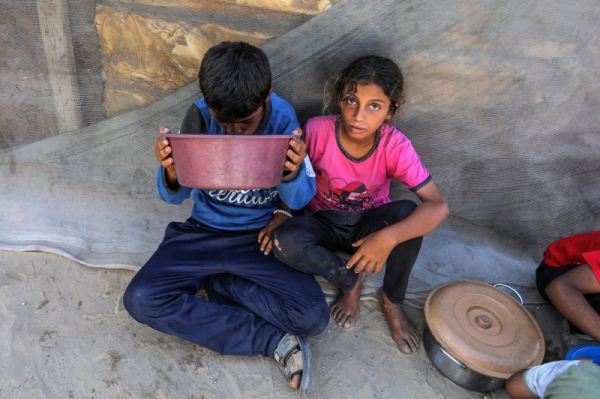

Palestinian children eat a hot meal of beans provided by a charity-run food kitchen at a refugee camp in Khan Younis in southern Gaza. File photo by Anas Deeb/UPI | License Photo
A group of more than 100 human rights groups and international aid charities called for an Israel-U.S.-backed mechanism for distributing humanitarian aid in Gaza to be scrapped after at least 500 Palestinians were killed and 4,000 injured in its first month of operation.
Oxfam, Save the Children, Medecins Sans Frontieres, the Norwegian Refugee Council, Amnesty International and other NGOs operating in Gaza in a joint statement Monday called for immediate action to end the Gaza Humanitarian Foundation operation and revert to the U.N.-led distribution system that existed prior to Israel’s blockade of humanitarian aid.
The groups said under the GHF scheme, four military-run distribution hubs had replaced 400 aid distribution points across Gaza that operated during the January to March cease-fire, forcing two million people into “overcrowded, militarized zones where they face daily gunfire and mass casualties while trying to access food and are denied other life-saving supplies.”
The weeks since the first two centers run by the GHF, which uses armed private contractors to provide security, opened May 27 in Rafah have been some of the deadliest and most violent since the conflict began on Oct. 7, 2023, according to the statement.
“Today, Palestinians in Gaza face an impossible choice: starve or risk being shot while trying desperately to reach food to feed their families. The humanitarian system is being deliberately and systematically dismantled by the Government of Israel’s blockade and restrictions, a blockade now being used to justify shutting down nearly all other aid operations in favour of a deadly, military-controlled alternative that neither protects civilians nor meets basic needs.
“Experienced humanitarian actors remain ready to deliver life-saving assistance at scale. Yet more than 100 days since Israeli authorities reimposed a near-total blockade on aid and commercial goods, Gaza’s humanitarian conditions are collapsing faster than at any point in the past 20 months,” the statement said.
The groups painted a picture where malnourished civilians were compelled to undertake hours-long journeys on foot through active conflict zones to reach aid hubs, where scenes of chaos ensue as thousands scramble to enter via a single point of access and once inside are left to fight it out for the supplies on offer.
Areas around the centers had become killing zones where international humanitarian law was ignored and children were killed or hurt in half of the incidents, with little prospect of receiving emergency medical treatment because Gaza’s health care system was “in ruins” and ambulances were unable to reach casualties.
GHF denied its centers were killing zones and said it was the victim of an orchestrated “misinformation campaign” aimed at driving it out of Gaza.
The casualty figures come from Gaza’s Health Ministry, which is run by Hamas, but there have been eyewitness reports of people injured and killed after being fired on by Israel Defense Forces, as well as medics treating casualties.
Last week, the U.N. Human Rights Office said it had documented at least 410 Palestinians killed by IDF gunfire or shelling while attempting to collect food boxes from food hubs, with the agency saying “a likely war crime” had been committed.
It said it was looking into separate reports of a further 93 people killed after approaching the small number of food convoys of the United Nations and other aid providers still operating in Gaza.
Israeli media reported Monday that the Israel Defense Forces, which has previously acknowledged firing warning shots in the direction of — but not at — crowds gathering near aid distribution centers, had admitted cases of “inaccurate” artillery fire that resulted in casualties and some fatalities.
The IDF told the BBC on Monday it was investigating the reports and that “any allegation of a deviation from the law or IDF directives will be thoroughly examined and further action will be taken as necessary.”
Separately, in a post on X, the IDF said it had “learned lessons,” implementing many changes around the aid hubs designed to “ensure safe civilian passage, orderly aid distribution and the continuity of IDF operations.”
“Troops reorganized the access routes and center — marking them, installing signs, opening new routes and setting up barriers and checkpoints. Layouts were adjusted to allow visual tracking of remaining aid.
“Following previous lessons, the Tel al-Sultan distribution center [in Rafah] was temporarily closed and a new center was established nearby to reduce civilian friction and ensure the safety of IDF soldiers.”
Israel has said it imposed the original blockade and sought an alternate aid delivery mechanism to prevent Hamas from stealing or misappropriating supplies for its own ends.